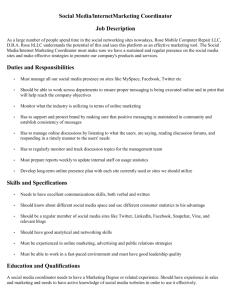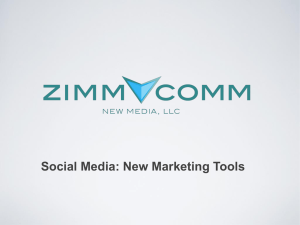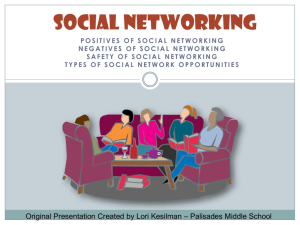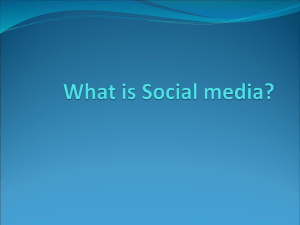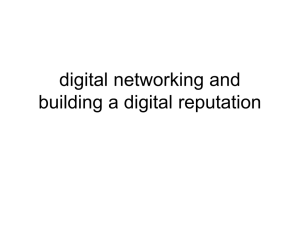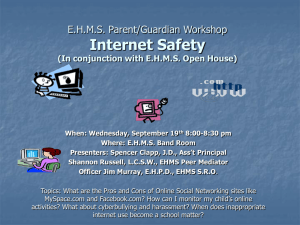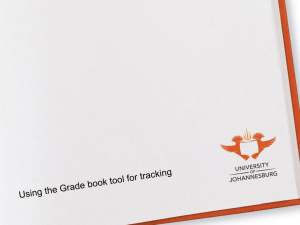Research Paper - Nathalie's Page
advertisement
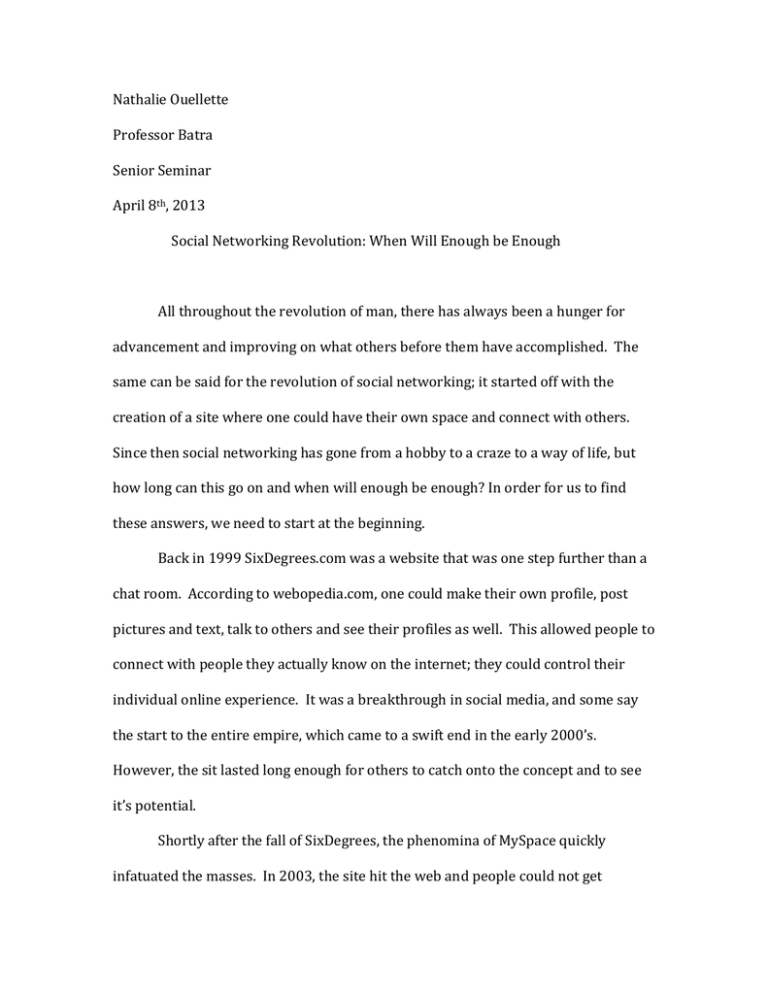
Nathalie Ouellette Professor Batra Senior Seminar April 8th, 2013 Social Networking Revolution: When Will Enough be Enough All throughout the revolution of man, there has always been a hunger for advancement and improving on what others before them have accomplished. The same can be said for the revolution of social networking; it started off with the creation of a site where one could have their own space and connect with others. Since then social networking has gone from a hobby to a craze to a way of life, but how long can this go on and when will enough be enough? In order for us to find these answers, we need to start at the beginning. Back in 1999 SixDegrees.com was a website that was one step further than a chat room. According to webopedia.com, one could make their own profile, post pictures and text, talk to others and see their profiles as well. This allowed people to connect with people they actually know on the internet; they could control their individual online experience. It was a breakthrough in social media, and some say the start to the entire empire, which came to a swift end in the early 2000’s. However, the sit lasted long enough for others to catch onto the concept and to see it’s potential. Shortly after the fall of SixDegrees, the phenomina of MySpace quickly infatuated the masses. In 2003, the site hit the web and people could not get enough. It was a way for one’s self to create them selves online. They could upload music, post pictures, talk to their friends or strangers, they had a version of their life online. The site was particularly popular among teens and musicians because it was more seen as a form of expression, a piece of themselves that they could control and not their parents. However, along came bigger and easier things. With the advancement in social networking sites, people were not only searching for the access to others that previous sights gave, but also for ways to do it better and more. In 2004 came what is arguably the most influential site in the history of social networks, so much so that according to benmartin.pro, there were 1,684,478 posts on this website per minute in 2012. Facebook is the phenomina that changed social networking as it was known. The site itself is so large that the options and opportunities are endless. You can chat, comment, post words and pictures, edit your own profile, select levels of privacy, play games, control friends and their access, you can virtually do anything. It is essentially a better version of MySpace, except Facebook has changed with it’s audience over the past nine years. They look and learn from sites such as MySpace and SixDegrees and learned that people wanted change after time, so they got bored and moved on to the next best thing. To fix the problem, Facebook continuously makes themselves the next best thing. Their strategy appears to be working because according to benmartin.pro, if Facebook were a country, it would be the third largest in the world. Of course, their have been sites since Facebook that have become wildly popular and have maintained their status throughout the years, such as Twitter, YouTube, Instagram, all of these sights have been created for specific needs. Twitter is essentially just like a status on Facebook, it is a post with words or a picture that wou send with 140 characters or less. You follow different users to see what they are saying and you can monitor who sees your profile if you so choose. YouTube is like posting videos on Facebook, however you do not need a profile to view most videos, just to upload or comment on them. Instagram is a new app for those with smart phones, where they can take pictures and post them to the site with a caption like Twitter. Again you have and account and followers and you can comment on others posts as they can yours. All of these sites essentially focus on a part of Facebook and focus on it. This has given them the ability to succeed over the years because they are not trying to compete with what already exists they are simply trying to coexist, and all have been able to do so because the users like the option and power of being able to choose which outlet to pour themselves into at a certain time. Other poplar sites include LinkdIn, which is utilized by companies and potential employees to find jobs and connect with others, Pinterest, which is followers who “pin” different ideas shared on their profile or “board”, and Wikipedia, the online encyclopedia. With the growth in social networking sites it has become easier for people to express and share themselves to the world, and in this way these sites have begun to change the world, for better and for worse. According to socialnetworking.procon.org, there have been several benefits to our society by social networking. For instances, social networks is where 50% of users go to get their news, and perhaps more quickly they would through print or television. An example is the shooting at the movie theater in Aurora, Colorado in 2012. The shooting was on YouTube and Twitter before police and news casters arrived on the scene. Law enforcement is another field that benefits from these networking sites, and 67% of all law enforcement officers agree that such sites have helped crime. For instance, when the Stanley Cup was stolen from the Canucks in Vancouver, officers used photos, posts, and tips from these sights to capture the criminals and recover the cup. Relationships have also benefited, as 70% of users use these sights to stay connected to family and friends, and 50% use them to make new friends. And finally, companies and potential employers can be found on two or more social networking sights, and use them to promote their companies, employment opportunities, and to look for potential employees. The benefits are numerous for these sites, but when evaluating anything, you have to look at the whole picture; the good and the bad. Again, looking back to socialnetworking.procon.org, there are numerous cons to our beloved connections to the rest of the world. Earlier we said that social networking can help employment, but it can cripple it as well. Employers have the ability to search candidates on social networking sites and sometimes what they see can sway their decision, for instance, profanity, posts about drugs, alcohol, sex, and even improper grammar and spelling can prevent one for getting or keeping a job. In 2011, U.S. Representative Anthony Weiner had to resign due to a Twitter sexting scandal that went public. Another example is certain Olympians were banned from the games in 2012 due to racist posts found on their profiles. Education has also been proven to be affected by social media. Students who heavily use social networking sites had an average GPA of 3.06 while those who didn’t had an average GPA of 3.86 and tested 20% higher on test to those heavier users. Another danger in these sites is that of misinformation, in fact 49.1% of surveyed users admit they had been misinformed by social networking sites. For instance, on September 5, 2012, there had been posts on Facebook and Twitter about shootings and fires in Mexico City, that alarmed citizens and police, caused parts of the city to close down, and nothing was actually going on. And finally there is the issue of privacy. Over 13 million users of Facebook admitted that had not set or were oblivious to the privacy settings available to them on Facebook. Another 28% of users leave everything open to the public. So even though these sites provide the power of expression to the public, it also has its consequences. So, what does the future have in store for the world and social networking. With the rate of advancement that we have seen in the past decade, my theory is that we will become so dependent on these ways of communication in the future that in the future we may not need to speak at all. It will be easier and less effort to describe all of our emotions in 140 characters or less. However, according to an article by Raghav Singh on ere.net, it is thought that maybe the fad of social networking will wear off and people will become bored with idea like they did with MySpace and SixDegrees.com. According to the article, 34% of Facebook users surveyed admitted to be using the site less, and only 3% said they would start using it more again in the next year. With all of the options and sites a few years old, the people are becoming bored with what they have and need change. Although it was good for a while that a lot of the sites were connected such as Facebook, YouTube, and Instagram, where you can post photos and videos from these sites to Facebook, was exciting, the “honeymoon has ended.” The article goes on to say that if there is no change soon, the numbers will continue to drop, and people will go back to the basics if until something new and better comes along. So, with all of this said, the question is: when will enough be enough? With all of these different sites, functions, pros, cons, and possible futures, there are so many ways for people to connect and express themselves and they are still not happy. It goes back to the beginning when I said that humans always want to move forward, but the technology is trying to keep up, but why can’t the public be content? We have found ways to connect on so many levels, pictures, videos, thoughts, that we are running out of ways to do so. It seems that what the people have been obsessed with and wanted for years, social networking, may meet it’s fate by the same peoples greed, that because they are simply bored, they will abandon the thing they once cherished most, but looking at the pros and cons there can be arguments said for letting the fad burn out or fighting to keep the flame lit. In the end, will the boredom of the seeming standstill in advancement, coupled with the negative aspects of misinformation, privacy intrusion, and so be enough to satisfy the people’s hunger of social media? Or will the positive aspects like the increase in aid to law enforcement, employment, and self-expression be enough for the masses to stay connected and supporting the networks they are so invested in. I guess only time will tell what is up to the people to decide.
